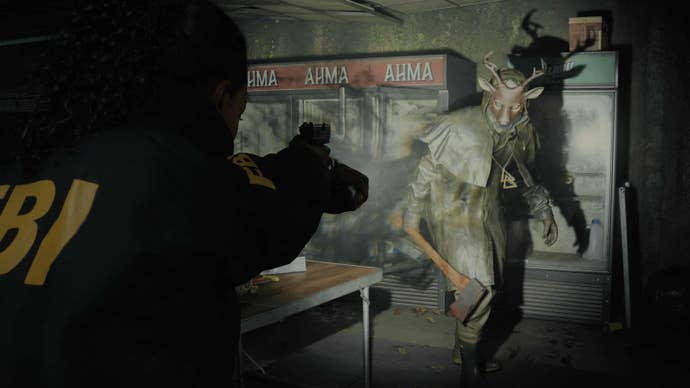Products You May Like
Alan Wake 2 is finally out, can you believe it? It’s got it all; amazing style, some of the best graphics you’ve ever seen, and an interesting story, to boot. Like the original, Alan Wake 2 stands out from the pack – distinct from most of what else is out there at the moment. But after the success of the original – and its easy ascent to ‘cult’ status – why did a sequel take so long to make?
“We were planning on going straight to a sequel after the first game,” Sam Lake, creative director at Remedy Entertainment, tells me in an interview. “We even had some ideas on what Alan Wake 3 could be! But the industry moves like waves, and the focus shifted from a publisher perspective,” Lake states. “Getting funding wasn’t possible, as there was no interest in continuing [Alan Wake] and doing a single player experience.”
The video game industry, shortly after the release of Alan Wake, was one where multiplayer was king. EA famously stated that single player games were dead, the same year Alan Wake launched. Legendary game developer Mark Cerny stated at a GDC talk in 2011 that single player games would be gone in three years, and this opinion didn’t vanish overnight. As the years went by, studios maintained that the economics of traditional single player releases were complicated. The potential profits of multiplayer experiences (and early micro-transaction focused content) were too seductive.
Alan Wake was the last out the door. While Lake and his peers were keen to make the next entry in the title to sieze on the momentum of the first game, the consumer appetite didn’t align with Remedy’s vision. This strange environment led the developer to create a whole new IP, leaving Alan Wake (fittingly) in the dark. “That led us to Quantum Break,” exclaims Lake. “At the time, Microsoft was looking into live action a lot. We included that in our pitch for Alan Wake 2; my idea was to do episodes of live action in between game episodes. That they loved… and uh, that’s the only thing they loved (laughter).
“So we created a new concept around it. I went to my archives where I had these ideas, and one was time travel – which we ended up going with. But at that point, it was very clear that with how things had shifted, it was impossible to get a deal with a publisher where they would not end up owning the IP. So, from the beginning, it was clear Quantum Break would be Microsoft’s IP – and we didn’t want to lose the Alan Wake IP.”
And rightly so. The exceptional launch of Alan Wake 2 has proved that Lake was right to want to keep hold of the IP. And a large part of what has driven that success for the game are the technical achievements within – that sound design, the motion capture, and (importantly) the graphics.
“Visuals are always important,” says Lake. “Mikko Kinnunen is our art director, and I absolutely love working with him. We were looking into a lot of stylised arthouse horror for inspiration. Modern things in photography – like flat space photography in darkness. Applying this layer of stylisation, especially related to the supernatural presence in [Alan Wake 2], I feel really really good about. I also do love the layered experience; you can shift between these two worlds and these rooms in their heads. How instantaneous it is… it would not have been possible in previous generations.”
As for where this leaves Remedy and Alan Wake, the future looks bright for both. Not only is the studio reportedly looking into future Control and Max Payne games, Lake confirmed to me that ideas are flowing around how to build upon Alan Wake as a franchise. “Yeah, for sure we’re thinking of building more out of it. But maybe it’s too early to start outlining any of those ideas…”
If you’re eager for more Alan Wake 2, check out our articles on the face of Max Payne, Sam Lake, on if he regrets using his likeness in the games, as well as whether a triple-A dark fantasy blockbuster be on the cards for Alan Wake 2 dev.
